- Home
- Stephen R. Donaldson
The Power That Preserves Page 2
The Power That Preserves Read online
Page 2
He moved aimlessly at first, drove the inanition of his bones as fast as he could deep into the woodland with no aim except flight. But as sunset filled the hills, cluttered the trails with dusk, he bent his steps toward the town. The thought of people drew him like a lure. While he stumbled through the twilit spring evening, odd, irrational surges of hope jabbed his heart. At erratic intervals, he thought that the mere sight of a forthright, unrecriminating face would steady him, bring the extremities of his plight back within his grasp.
He feared to see such a face. The implicit judgment of its health would be beyond his endurance.
Yet he jerked unevenly on through the woods like a moth fluttering in half-voluntary pursuit of immolation. He could not resist the cold siren of people, the allure and pain of his common mortal blood. Help! He winced as each cruel hope struck him. Help me!
But when he neared the town-when he broke out of the woods in back of the scattered old homes which surrounded like a defensive perimeter the business core of the small town-he could not muster the courage to approach any closer. The bright-lit windows and porches and driveways seemed impassable: he would have to brave too much illumination, too much exposure, to reach any door, whether or not it would welcome him. Night was the only cover he had left for his terrible vulnerability.
Whimpering in frustration and need, he tried to force himself forward. He moved from house to house, searching for one, any one, which might offer him some faint possibility of consolation. But the lights refused him. The sheer indecency of thrusting himself upon unwitting people in their homes joined his fear to keep him back. He could not impose on the men and women who lived in sanctuary behind the brightness. He could not carry the weight of any more victims.
In this way-dodging and ducking around the outskirts of the community like a futile ghost, a ghoul impotent to horrify-he passed the houses, and then returned as he had come, made his scattered way back to Haven Farm like a dry leaf, brittle to the breaking point, and apt for fire.
At acute times during the next three days, he wanted to burn his house down, put it to the torch-make it the pyre or charnel of his uncleanness. And in many less savage moods, he ached to simply slit his wrists-open his veins and let the slow misery of his collapse drain away. But he could not muster the resolution for either act. Torn between horrors, he seemed to have lost the power of decision. The little strength of will that remained to him he spent in denying himself food and rest.
He went without food because he had fasted once before, and that hunger had helped to carry him through a forest of self-deceptions to a realization of the appalling thing he had done to Lena, Elena's mother. Now he wanted to do the same; he wanted to cut through all excuses, justifications, digressions, defenses, and meet his condition on its darkest terms. If he failed to do this, then any conclusion he reached would be betrayed from birth, like Elena, by the inadequacy of his rectitude or comprehension.
But he fought his bone-deep need for rest because he was afraid of what might happen to him if he slept. He had learned that the innocent do not sleep. Guilt begins in dreams.
Neither of these abnegations surpassed him. The nausea lurking constantly in the pit of his stomach helped him to keep from food. And the fever of his plight did not let him go. It held and rubbed him like a harness; he seemed to have the galls of it on his soul. Whenever the penury of his resources threatened him, he gusted out of his house like a lost wind, and scudded through the hills for miles up and down the wooded length of Righters Creek. And when he could not rouse himself with exertion, he lay down across the broken furniture in his living room, so that if he dozed he would be too uncomfortable to rest deeply enough for dreams.
In the process, he did nothing to care for his illness. His VSE-the Visual Surveillance of Extremities on which his struggle against leprosy depended-and other self-protective habits he neglected as if they had lost all meaning for him. He did not take the medication which had at one time arrested the spreading of his disease. His forehead festered; cold numbness gnawed its slow way up the nerves of his hands and feet. He accepted such things, ignored his danger. It was condign; he deserved it.
Nevertheless, he fell into the same fey mood every evening. In the gloom of twilight, his need for people became unendurable; it drew him spitting and gnashing his teeth to the outer darkness beyond the home lights of the town. Night after night he tried to drive himself to the door of a home, any home. But he could not raise his courage high enough to accost the lights. People within a stone's throw of him remained as unattainable as if they occupied another world. Each night he was thrown back for companionship on the unrelieved aspect of his own weakness-and on the throbbing ache which filled his skull as the infection in his forehead grew.
Elena had died because of him. She was his daughter, and he had loved her. Yet he had trapped her into death.
She had never even existed.
He could find no answer to it.
Then, Thursday night, the pattern of his decline was broken for him. In the process of his futile ghosting, he became aware of sounds on the dark breeze. A tone rose and fell like a voice in oratory, and between its stanzas he heard singing. Disembodied in the darkness, the voices had a tattered, mournful air, like an invitation to a gathering of damned souls-verses and chorus responding in dolor to each other. Elena had been a singer, daughter of a family of singers. Fumbling his way through the benighted outskirts of the town, he followed the reft sorrow of the music.
It led him past the houses, around the town, down the road to the barren field which served as a parade ground whenever the town celebrated a patriotic occasion. A few people were still hurrying toward the field as if they were late, and Covenant avoided them by staying off the road. When he reached the parade ground, he found that a huge tent had been erected in its center. All the sides of the tent were rolled up, so that the light of pressure lanterns shone vividly from under the canvas.
People filled the tent. They were just sitting down on benches after singing, and during the movement, several ushers guided the latecomers to the last empty seats. The benches faced in tight rows toward a wide platform at the front of the tent, where three men sat. They were behind a heavy pulpit, and behind them stood a makeshift altar, hastily hammered together out of pine boards, and bleakly adorned by a few crooked candles and a dull, battered gold cross.
As the people settled themselves on the benches, one of the men on the platform-a short fleshy man dressed in a black suit and a dull white shirt-got to his feet and stepped to the pulpit. In a sonorous, compelling voice, he said, "Let us pray."
All the people bowed their heads. Covenant was on the verge of turning away in disgust, but the quiet confidence of the man's tone stayed him. He listened unwillingly as the man folded his hands on the pulpit and prayed gently:
"Dear Jesus, our Lord and Saviour-please look down on the souls that have come together here. Look into their hearts, Lord-see the pain, and the hurt, and the loneliness, and the sorrow-yes, and the sin-and the hunger for You in their hearts. Comfort them, Lord. Help them, heal them. Teach them the peace and the miracle of prayer in Thy true name. Amen.''
Together, the people responded, "Amen."
The man's voice tugged at Covenant. He heard something in it that sounded like sincerity, like simple compassion. He could not be sure; he seemed to have learned what little he knew about sincerity in dreams. But he did not move away. Instead, while the people raised their heads from prayer, he moved cautiously forward into the light, went close enough to the tent to read a large sign posted at the side of the road. It said:
The EASTER HEALTH Crusade-
Dr. B. Sam Johnson
revivalist and healer
tonight through Sunday
only.
On the platform, another man approached the pulpit. He wore a clerical collar, and a silver cross hung from his neck. He pushed his heavy glasses up on his nose, and beamed out over the people. "I'm pleased as punch," he said
, "to have Dr. Johnson and Matthew Logan here. They're known everywhere in the state for their rich ministry to the spiritual needs of people like us. I don't need to tell you how much we need reviving here-how many of us need to recover that healing faith, especially in this Easter season. Dr. Johnson and Mr. Logan are going to help us return to the matchless Grace of God."
The short man dressed in black stood up again and said, "Thank you, sir." The minister hesitated, then left the pulpit as if he had been dismissed-cut off in the opening stages of a fulsome introduction-and Dr. Johnson went on smoothly: "My friends, here's my dear brother in Christ, Matthew Logan. You've heard his wonderful, wonderful singing. Now he'll read the Divine Word of God for us. Brother Logan."
As he stepped to the pulpit, Matthew Logan's powerful frame towered over Dr. Johnson. Though he seemed to have no neck at all, the head resting on his broad shoulders was half a yard above his partner's. He flipped authoritatively through a massive black Bible on the pulpit, found his place, and bowed his head to read as if in deference to the Word of God.
He began without introduction:
" 'But if you will not hearken to me, and will not do all these commandments, but break my covenant, I will do this to you: I will appoint over you sudden terror, consumption, and fever that waste the eyes and cause life to pine away. And you shall sow your seed in vain, for your enemies shall eat it; those who hate you shall rule over you, and you shall flee when none pursues you. I will make your heavens like iron and your earth like brass; and your strength shall be spent in vain, for your land shall not yield its increase, and the trees of the land shall not yield their fruit.
'' Then if you walk contrary to me, and will not hearken to me, I will bring more plagues upon you, sevenfold as many as your sins. And I will let loose the wild beasts among you, which shall rob you of your children, and destroy your cattle, and make you few in number, so that your ways shall become desolate. I also will walk contrary to you, and I will bring a sword upon you, and shall execute vengeance for the covenant; and if you gather within your cities I will send pestilence among you, and you shall be delivered into the hand of the enemy.' "
As Matthew Logan rolled out the words, Covenant felt their spell falling on him. The promise of punishment caught at his heart; it snared him as if it had been lying in ambush for his gray, gaunt soul. Stiffly, involuntarily, he moved toward the tent as the curse drew him to itself.
'And if in spite of this you will not hearken to me, but walk contrary to me, then I will walk contrary to you in fury, and chastise you myself sevenfold for your sins. You shall eat the flesh of your sons, and you shall eat the flesh of your daughters. My soul will abhor you. I will lay your cities waste. I will scatter you among the nations, and I will unsheathe the sword after you; and your land shall be a desolation, and your cities shall be a waste.
'Then the land shall pay for its sabbaths as long as it lies desolate Covenant ducked under an edge of the canvas and found himself standing beside an usher at the rear of the tent. The usher eyed him distrustfully, but made no move to offer him a seat. High on the platform at the other end, Matthew Logan stood like a savage patriarch leveling retribution at the bent, vulnerable heads below him. The curse gathered a storm in Covenant, and he feared that he would cry out before it ended. But Matthew Logan stopped where he was and flipped through the Bible again. When he found his new place, he read more quietly:
" 'Whoever, therefore, eats the bread or drinks the cup of the Lord in an unworthy manner will be guilty of profaning the body and blood of the Lord. Anyone who eats and drinks without discerning the body eats and drinks judgment upon himself. That is why many of you are weak and ill, and some have died. But if we judged ourselves truly, we should not be judged. But when we are judged by the Lord, we are chastened so that we may not be condemned along with the world.' "
Slapping the Bible closed, he returned stolidly to his seat.
At once, Dr. B. Sam Johnson was on his feet. Now he seemed to bristle with energy; he could not wait to begin speaking. His jowls quivered with excitement as he addressed his audience.
"My friends, how marvelous are the Words of God! How quick to touch the heart. How comforting to the sick, the downtrodden, the weak. And how easily they make even the purest of us squirm. Listen, my friends! Listen to the Word of the Apocalypse:
" 'To the thirsty I will give water without price from the fountain of the water of life. He who conquers shall have this heritage, and I will be his God and he shall be my son. But as for the cowardly, the unbelievers, the polluted, as for murderers, fornicators, sorcerers, idolaters, and all liars, their lot shall be in the lake that burns with fire and brimstone, which is the second death.'
"Marvelous, marvelous Words of God. Here in one short passage we hear the two great messages of the Bible, the Law and the Gospel, the Old Covenant and the New. Brother Logan read to you first from the Old Testament, from the twenty-sixth chapter of Leviticus. Did you hear him, my friends? Did you listen with all the ears of your heart? That is the voice of God, Almighty God. He doesn't mince words, my friends. He doesn't beat around the bush. He doesn't hide things in fine names and fancy language. No! He says, if you sin, if you break My Law, I will terrify you and make you sick. I will make the land barren and attack you with plagues and pestilence. And if you still sin, I will make cannibals and cripples out of you. 'Then the land shall pay for its sabbaths as long as it lies desolate.'
"And do you know what the Law is, my friends? I can summarize it for you in the Words of the Apocalypse. 'Thou shalt not be cowardly, or unbelieving, or polluted.' Never mind murder, fornication, sorcery, idolatry, lies. We're all good people here. We don't do things like that. But have you ever been afraid? Have you ever faltered just a bit in your faith? Have you ever failed to keep yourself clean in heart and mind? 'Then the land shall pay for its sabbaths as long as it lies desolate.' The Apostle Paul calls a spade a spade. He says, 'That is why many of you are weak and ill, and some have died.' But Jesus goes further. He says, 'Depart from me, you cursed, into the eternal fire prepared for the devil and his angels.'
"Do I hear you protesting? Do I hear some of you saying to yourselves, 'No one can be that good. I'm human. I can't be perfect.' You're right! Of course, you're right. But the Law of God doesn't care for your excuses. If you're lame, if you've got arthritis, if you're going blind or your heart is failing, if you're crippled, if you've got multiple sclerosis or diabetes or any other of those fancy names for sin, you can be sure that the curse of God is on you. But if you're healthy, don't think you're safe! You're just lucky that God hasn't decided to 'walk contrary to you in fury.' You can't be perfect, my friends. And the Law doesn't care how hard you tried. Instead of telling yourself what a valiant try you made, listen to the Bible. The Old Covenant says to you as plain as day, 'The leper who has the disease shall wear torn clothes and let the hair of his head hang loose, and he shall cover his upper lip and cry, "Unclean, unclean." ' "
He held his audience in the palm of his hand now. The orotund resonance of his voice swept them all together in one ranked assembly of mortality and weakness. Even Covenant forgot himself, forgot that he was an intruder in this canvas tabernacle; he heard so many personal echoes and gleams in the peroration that he could not resist it. He was willing to believe that he was accursed.
"Ah, my friends," Dr. Johnson went on smoothly, "it's a dark day for us when illness strikes, when pain or dismemberment or bereavement afflict us, and we can no longer pretend we're clean. But I haven't told you about the Gospel yet. Do you remember Christ saying, 'He who loses his life for my sake shall find it' ? Did you hear Paul say, 'When we are judged by the Lord, we are chastened so that we may not be condemned along with the world'? Did you hear the writer of the Apocalypse say, 'He who conquers shall have this heritage, and I will be his God and he shall be my son'? There's another side, my friends. The law is only half of God's holy message. The other half is chastening, heritage, forgiveness, healing-the Mercy that m
atches God's Righteousness. Do I have to remind you that the Son of God healed everyone who asked Him? Even lepers? Do I have to remind you that He hung on a cross erected in the midst of misery and shame to pay the price of our sin for us? Do I have to remind you that the nails tore His hands and feet? That the spear pierced His side? That He was dead for three days? Dead and in hell?
''My friends, He did it for only one reason. He did it to pay for all our cowardly, unbelieving, unclean sabbaths, so that we could be healed. And all you have to do to get healed is to believe it, and accept it, and love Him for it. All you have to do is say with the man whose child was dying, 'I believe; help my unbelief!' Five little words, my friends. When they come from the heart, they're enough to pay for the whole Kingdom of Righteousness."
As if on cue, Matthew Logan stood up and began singing in soft descant, "Blessed assurance, Jesus is mine." Against this background, Dr. Johnson folded his hands and said, "My friends, pray with me."
At once, every head in the audience dropped. Covenant, too, bowed. But the wound on his forehead burned extravagantly in that position. He looked up again as Dr. Johnson said, "Close your eyes, my friends. Shut out your neighbors, your children, your parents, your mate. Shut out every distraction. Look inward, my friends. Look deep inside yourselves, and see the sickness there. Hear the voice of God saying, Thou art weighed in the balance, and found wanting.' Pray with me in your hearts.
"Dear holy Jesus, Thou art our only hope. Only Thy Divine Mercy can heal the disease which riddles our courage, rots the fiber of our faith, dirties us in Thy sight. Only Thou canst touch the sickness which destroys peace, and cure it. We lay bare our hearts to Thee, Lord. Help us to find the courage for those five difficult, difficult words, 'I believe; help my unbelief!' Dear Lord, please give us the courage to be healed."
Without a break, he raised his arms over the audience and continued, ' 'Do you feel His spirit, my friends? Do you feel it in your hearts? Do you feel the finger of His Righteousness probing the sick spot in your soul and body ? If you do, come forward now, and let me pray for health with you.''

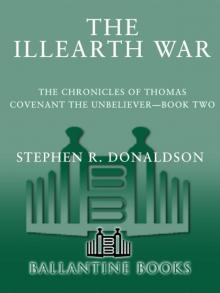 The Illearth War
The Illearth War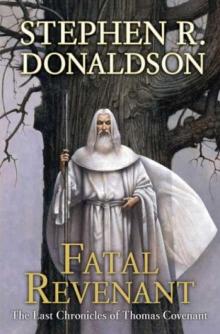 Last Chronicles of Thomas Covenant 02 - Fatal Revenant
Last Chronicles of Thomas Covenant 02 - Fatal Revenant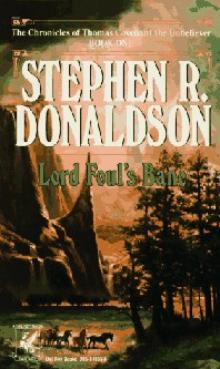 Lord Foul's Bane
Lord Foul's Bane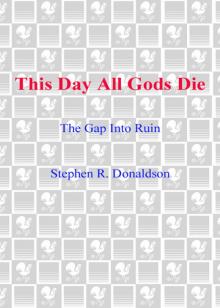 The Gap Into Ruin: This Day All Gods Die
The Gap Into Ruin: This Day All Gods Die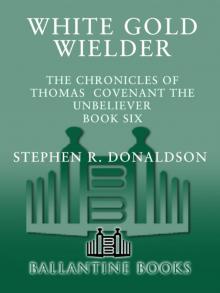 White Gold Wielder
White Gold Wielder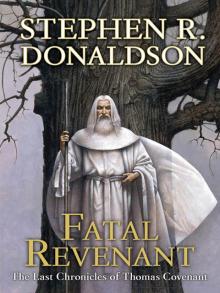 Fatal Revenant
Fatal Revenant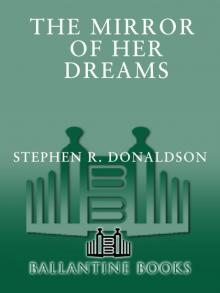 The Mirror of Her Dreams
The Mirror of Her Dreams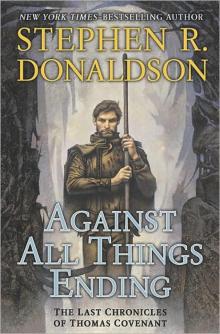 Against All Things Ending
Against All Things Ending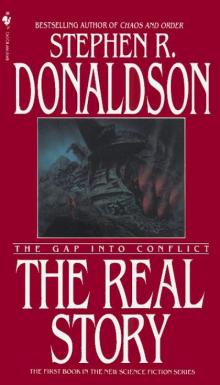 The Real Story: The Gap Into Conflict
The Real Story: The Gap Into Conflict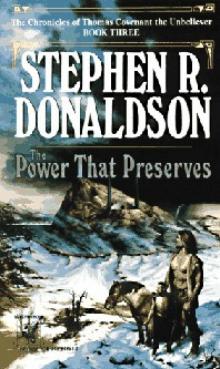 The Power That Preserves
The Power That Preserves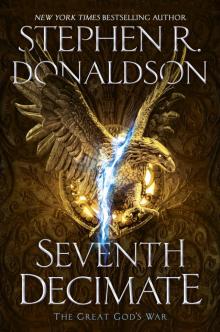 Seventh Decimate
Seventh Decimate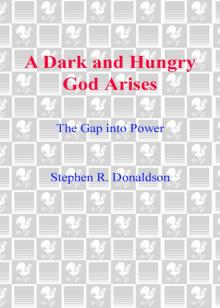 The Gap Into Power: A Dark and Hungry God Arises
The Gap Into Power: A Dark and Hungry God Arises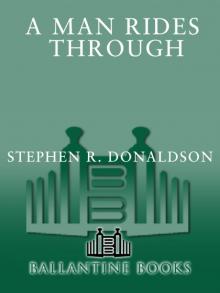 A Man Rides Through
A Man Rides Through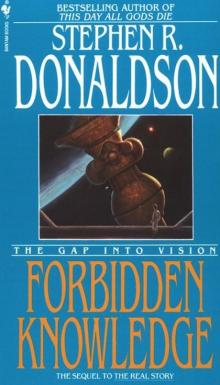 The Gap Into Vision: Forbidden Knowledge
The Gap Into Vision: Forbidden Knowledge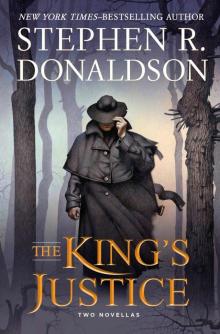 The King's Justice: Two Novellas
The King's Justice: Two Novellas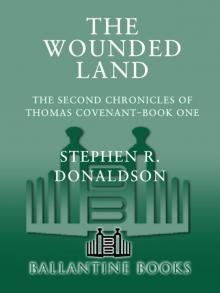 The Wounded Land
The Wounded Land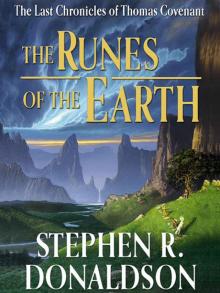 The Runes of the Earth
The Runes of the Earth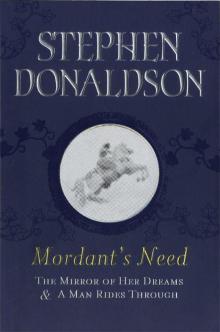 Mordant's Need
Mordant's Need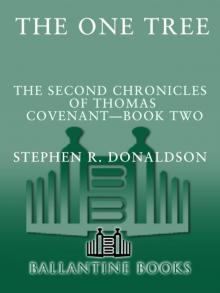 The One Tree
The One Tree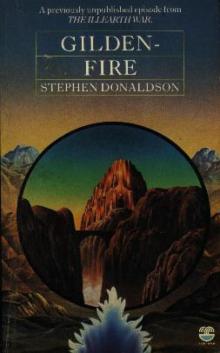 Gilden-Fire
Gilden-Fire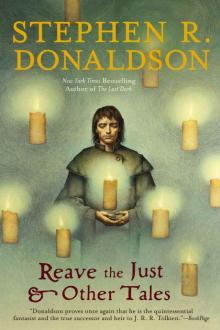 Reave the Just and Other Tales
Reave the Just and Other Tales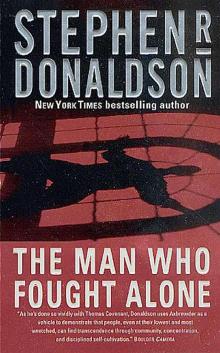 The Man Who Fought Alone
The Man Who Fought Alone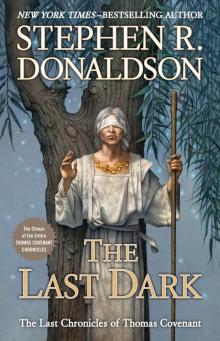 The Last Dark
The Last Dark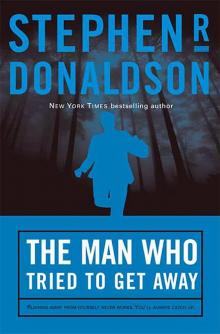 The Man Who Tried to Get Away
The Man Who Tried to Get Away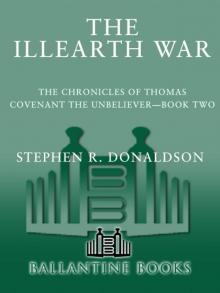 Thomas Covenant 02: The Illearth War
Thomas Covenant 02: The Illearth War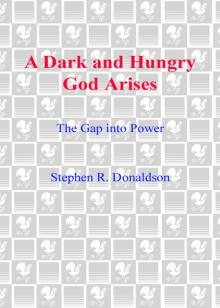 A Dark and Hungry God Arises
A Dark and Hungry God Arises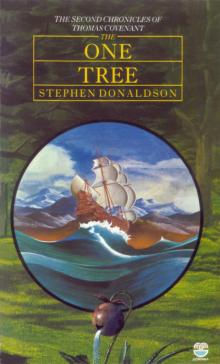 The One Tree t2cotc-2
The One Tree t2cotc-2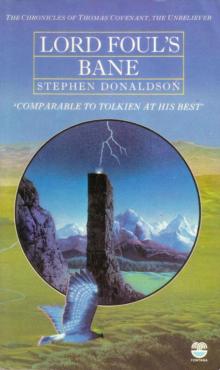 Lord Foul's Bane cotc-1
Lord Foul's Bane cotc-1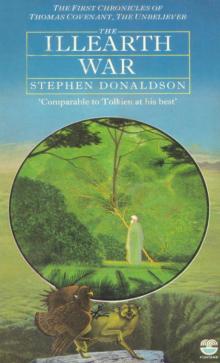 The Illearth War t1cotc-2
The Illearth War t1cotc-2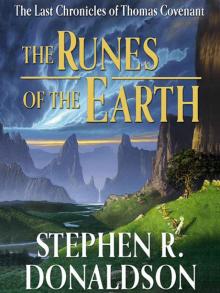 The Runes of the Earth: The Last Chronicles of Thomas Covenant - Book One
The Runes of the Earth: The Last Chronicles of Thomas Covenant - Book One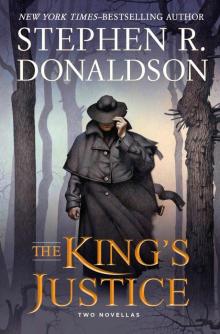 The King's Justice
The King's Justice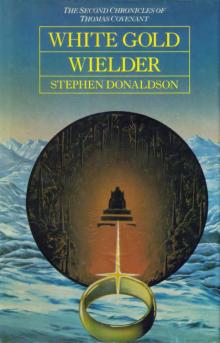 White Gold Wielder t2cotc-3
White Gold Wielder t2cotc-3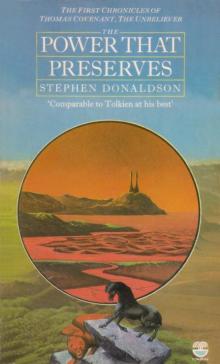 The Power That Preserves t1cotc-3
The Power That Preserves t1cotc-3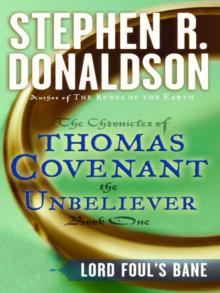 Thomas Covenant 01: Lord Foul's Bane
Thomas Covenant 01: Lord Foul's Bane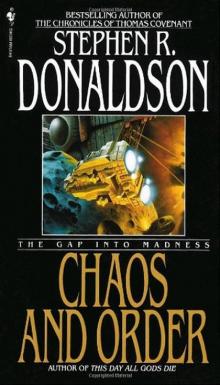 Chaos and Order: The Gap Into Madness
Chaos and Order: The Gap Into Madness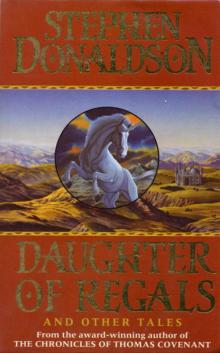 Daughter of Regals
Daughter of Regals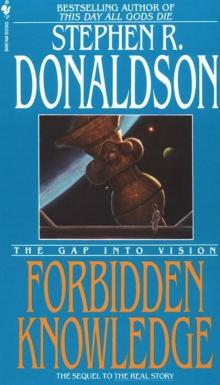 Forbidden Knowledge: The Gap Into Vision
Forbidden Knowledge: The Gap Into Vision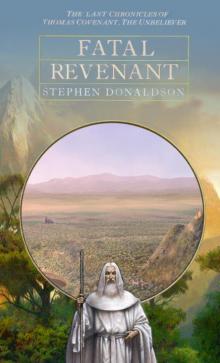 Fatal Revenant t3cotc-2
Fatal Revenant t3cotc-2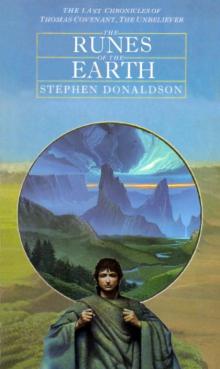 The Runes of the Earth t3cotc-1
The Runes of the Earth t3cotc-1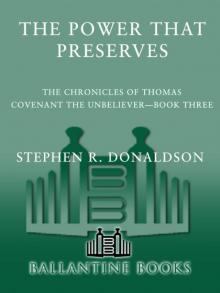 Thomas Covenant 03: Power That Preserves
Thomas Covenant 03: Power That Preserves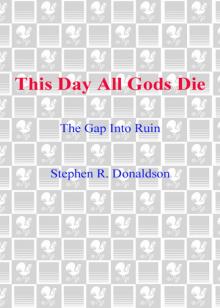 This Day all Gods Die: The Gap into Ruin
This Day all Gods Die: The Gap into Ruin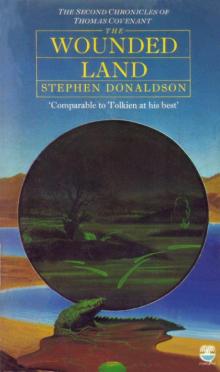 The Wounded Land t2cotc-1
The Wounded Land t2cotc-1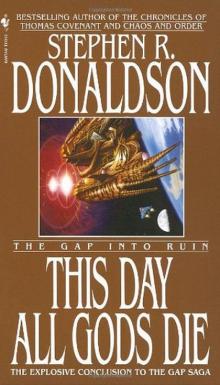 This Day All Gods Die
This Day All Gods Die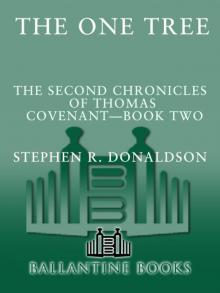 One Tree
One Tree